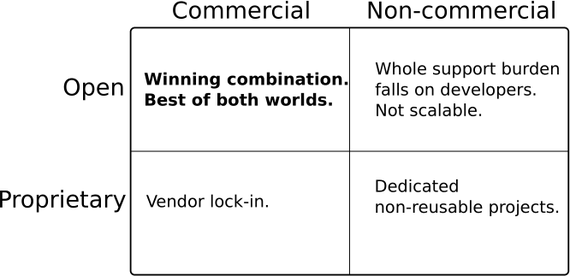Co-authored by Mitch Altman, co-founder of Noisebridge, and Sébastien Bourdeauducq, chairman of EHSM.
"Hacking" has become part of the mainstream lexicon, enough so that MIT now encourages new undergrads to "Keep Calm and Hack On". The imperative here, of course, being that hacking is not a dubious activity limited to the likes of Johnny Lee Miller types, as seen rollerblading the world to safety in the 1995 cult film, Hackers. Simply defined, hacking is about learning to do things and making things for all kinds of reasons, and sharing it. This has become a growing movement, spurring Do It Yourself (DIY) projects in all imaginable fields.
DIY and Beyond
DIY efforts are quite impressive. Some electronics books from the 1950s claimed making triode vacuum tubes would be an impossible endeavor for amateurs. Today, there are at least two DIY laboratories (built by Claude Paillard and Aleksander Zawada) making not only triodes but also all sorts of vacuum electron devices.
Three years after the first GPS satellite was launched, few people used the technology, which was perceived as very complicated and expensive. Yet, someone successfully operated his homebrew receiver made from hundreds of electronic parts he scrounged together.
Microchips, the heart of all of today's technology, are thought by most to be impenetrable and impossible to manufacture without large-scale facilities. Yet many individuals are reverse engineering microelectronics designs, often breaking security systems based on the obscurity of the silicon layout. Some are even devising DIY methods to replicate parts of the microchip manufacturing process, with impressive results.
The Promise of Open Source
In open source projects ideas are openly shared.
Until recently, most open source projects have been software, such as the popular Linux operating system. But over the past several years, open source hardware is emerging as a hot trend. Open source hardware is hardware whose specifications, usually in a digital format, are published and made available to the public, enabling anyone to copy, modify and redistribute the hardware design without paying royalties fees. There are only two common restrictions: if someone wants to make use of the ideas from an open source project, the originator of the project must be given credit, and the new project must be shared with the same open source license as the original project.
While open source software and hardware efforts often evolve through DIY efforts and community cooperation, those are sometimes limited in scope. Large and complex projects are often backed by companies and institutes like CERN, who created an open hardware license for this purpose.
(Credit: Javier Serrano, CERN)
Collaboration between open source and scientific research communities holds a lot of potential for open hardware to explore new grounds. By using and funding open designs, research institutes can get their designs reviewed by experts all around the world, reduce costs and improve efficiency through better design re-use, avoid vendor lock-in situations, and develop healthier relationships with contractors. Open hardware is also the logical choice for institutes that have a mission of knowledge dissemination. The open source communities also benefit from such institutional and commercial collaborations, as they foster the development of complex and highly advanced open technologies. The technologies then become available to anyone interested in making use of them, and improving upon them, thus spurring more innovation.
The Exceptionally Hard and Soft Meeting
What are the frontiers of DIY technology? There are currently several groups of very persistent, innovative and brilliant people exploring this. At the first Exceptionally Hard and Soft Meeting (EHSM), an open-source conference that we organized in December 2012, there were many presentations of incredible DIY achievements. The conference brought together scientists, engineers, hackers, DIY-ers, as well as others who didn't self-identify as those aforementioned groups.
The conference is not limited to DIY, but welcomes institutional open source efforts as well. This is a time when thousands of developers from hundreds of companies contribute to Linux; it is a time when the world's largest physics laboratories share openly licensed hardware designs on OHWR, we as a large community of learners, programmers, teachers, students and the generally curious, we, the organizers and attendees of EHSM are exploring cutting-edge open source hardware and software practices.
The second edition of EHSM is happening June 27th to 29th 2014 at DESY, the second-largest particle physics laboratory in Europe. Everyone is invited to submit relevant lectures or tutorials to the conference, and all curious persons can attend. All information is on our website http://ehsm.eu.
